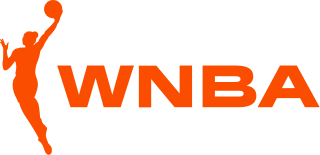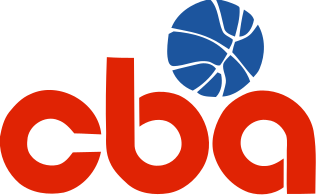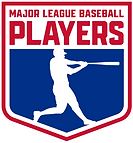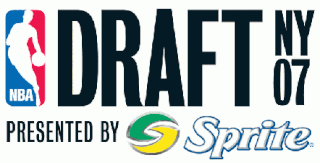
The Women's National Basketball Association (WNBA) is a women's professional basketball league based in the United States. It is composed of 12 teams. The league was founded on April 24, 1996, as the women's counterpart to the National Basketball Association (NBA), and league play started in 1997. The regular season is played from May to September, with the All-Star game being played midway through the season in July and the WNBA Finals at the end of September until the beginning of October.

The Continental Basketball Association (CBA), originally known as the Eastern Pennsylvania Basketball League, and later as the Eastern Professional Basketball League and the Eastern Basketball Association, was a men's professional basketball minor league in the United States from 1946 to 2009.
The NBA G League, or simply the G League, is the official minor league organization of the National Basketball Association (NBA). The league was known as the National Basketball Development League (NBDL) from 2001 to 2005, and the NBA Development League from 2005 until 2017. The league started with eight teams until NBA commissioner David Stern announced a plan to expand the NBA D-League to 15 teams and develop it into a true minor league farm system, with each NBA D-League team affiliated with one or more NBA teams in March 2005. At the conclusion of the 2013–14 NBA season, 33% of NBA players had spent time in the NBA D-League, up from 23% in 2011. As of the 2024–25 season, the league consists of 31 teams, 30 of which are either single-affiliated or owned by an NBA team, along with the Capitanes de Ciudad de México independent team. Within the G League, players can get a contract from an NBA team and land themselves an official roster spot.
The NBA Most Valuable Player Award (MVP) is an annual National Basketball Association (NBA) award given since the 1955–56 season to the best performing player of the regular season. Since the 2022–23 season, winners receive the Michael Jordan Trophy, named for the five-time MVP often considered to be the greatest player in NBA history.

The Major League Baseball Players Association (MLBPA) is the labor union representing all current Major League Baseball players. All players, managers, coaches, and athletic trainers who hold or have held a signed contract with a Major League club are eligible for membership in the Association.
The WNBA draft is an annual draft held by the WNBA through which WNBA teams can select new players from a talent pool of college and professional women's basketball players. The first WNBA draft was held in 1997.

Yi Jianlian is a Chinese former professional basketball player who last played for the Guangdong Southern Tigers of the Chinese Basketball Association (CBA). He also played in the National Basketball Association (NBA) for the Milwaukee Bucks, the New Jersey Nets, the Washington Wizards, and the Dallas Mavericks.
In the National Basketball Association (NBA), a sign-and-trade deal is a type of transaction allowed by the collective bargaining agreement (CBA) where one franchise/team signs an unrestricted free agent or restricted free agent player to a new contract, only to then immediately trade him to another team of the player's choosing. This is typically done to enable the player to obtain a higher salary and/or greater number of years on their contract than NBA salary cap rules would ordinarily allow a destination team that signs him directly to a contract.
The NBA salary cap is the limit to the total amount of money that National Basketball Association teams are allowed to pay their players. Like the other major professional sports leagues in North America, the NBA has a salary cap to control costs and benefit parity, defined by the league's collective bargaining agreement (CBA). This limit is subject to a complex system of rules and exceptions and is calculated as a percentage of the league's revenue from the previous season. Under the CBA ratified in July 2017, the cap will continue to vary in future seasons based on league revenues. For the 2023–24 season, the cap is set at $136.021 million.

The 2006 NBA draft was held on June 28, 2006, at the Theatre at Madison Square Garden in New York City and was broadcast in the United States on ESPN. In this draft, National Basketball Association (NBA) teams took turns selecting amateur U.S. college basketball players and other eligible players, including international players. This was also the only time the New Orleans Hornets would draft under the temporary name of the New Orleans/Oklahoma City Hornets as the city of New Orleans was still recovering from the events of Hurricane Katrina after the 2005-06 NBA season.

The 2007 NBA draft was held on June 28, 2007, at the WaMu Theatre at Madison Square Garden in New York City. It was broadcast on television in 115 countries. In this draft, National Basketball Association (NBA) teams took turns selecting amateur U.S. college basketball players and other eligible players, including international players.
The 2009 NBA draft was held on June 25, 2009, at the WaMu Theatre at Madison Square Garden in New York City. In this draft, the National Basketball Association (NBA) teams took turns selecting amateur U.S. college basketball players and other eligible players, including international players.

The 2010 NBA draft was held on June 24, 2010, at the Theatre at Madison Square Garden in New York City. The draft, which started at 7:00 pm Eastern Daylight Time, was broadcast in the United States on ESPN. In this draft, National Basketball Association (NBA) teams took turns selecting amateur U.S. college basketball players and other eligible players, including international players. This draft set a record with five players being drafted from the same school in the first round. The players were John Wall (first), DeMarcus Cousins (fifth), Patrick Patterson (fourteenth), Eric Bledsoe (eighteenth), and Daniel Orton (twenty-ninth), all from the University of Kentucky. This draft also marked the second time an NBA D-League player was drafted, with the first case coming in 2008.
The All-NBA Team is an annual National Basketball Association (NBA) honor bestowed on the best players in the league following every NBA season. The voting is conducted by a global panel of sportswriters and broadcasters. The team has been selected in every season of the league's existence, dating back to its inaugural season in 1946. The All-NBA Team originally had two teams, but since 1988 it is typically composed of three five-man lineups—a first, second, and third team.

The 2011 NBA draft was held on June 23, 2011, at Prudential Center in Newark, New Jersey. The draft started at 8:00 p.m. Eastern Daylight Time, and was broadcast in the United States on ESPN. Kia Motors was the presenting sponsor of the 2011 NBA draft. In this draft, National Basketball Association (NBA) teams took turns selecting amateur U.S. college basketball players and other eligible players, including international players. The Cleveland Cavaliers had the first pick due to a previous trade they had involving the Los Angeles Clippers, choosing point guard Kyrie Irving of Duke. Of the 60 players drafted, 7 were freshmen, 7 were sophomores, 14 were juniors, 19 were seniors, 12 were international players without U.S. college basketball experience, and 1 was a D-League player.
The collective bargaining agreement (CBA) of the National Basketball Association (NBA) is a contract between the league and the National Basketball Players Association (NBPA), the players' union, that dictates the rules of player contracts, trades, revenue distribution, the NBA draft, and the salary cap, among other things. In June 2005, the NBA's 1999 CBA expired, meaning the League and the players' union had to negotiate a new agreement; in light of the 2004–05 NHL lockout, the two sides quickly came to an agreement, and ratified a new CBA in July 2005. This agreement expired following the 2010–11 season, leading to the 2011 NBA lockout. A new CBA was ratified in December 2011, ending the lockout.
The NBA draft is a major annual event in which all the 30 franchises in the National Basketball Association select new players for their teams. Eligibility rules for prospective players have changed eight times during the history of the league. No player may sign with the NBA until they are 19 years or older.
The 1998–99 NBA lockout was the third lockout of four in the history of the National Basketball Association (NBA). It lasted from July 1, 1998, to January 20, 1999, and forced the 1998–99 regular season to be shortened to 50 games per team and that season's All-Star Game to be canceled. NBA owners reopened the league's collective bargaining agreement (CBA) in March 1998, seeking changes to the league's salary cap system and a ceiling on individual player salaries. The National Basketball Players Association (NBPA) opposed the owners' plans and wanted raises for players who earned the league's minimum salary. After the two sides failed to reach an agreement, the owners began the lockout.
Tom Penn is an American sports executive.
The 2011 NBA lockout was the fourth and most recent lockout in the history of the National Basketball Association (NBA). Team owners began the work stoppage upon expiration of the 2005 collective bargaining agreement (CBA). The 161-day lockout began on July 1, 2011 and ended on December 8, 2011. It delayed the start of the 2011–12 regular season from November to December, and it reduced the regular season from 82 to 66 games. The previous lockout in 1998–99 had shortened the season to 50 games. During the lockout, teams could not trade, sign, or contact players. Players additionally did not have access to NBA team facilities, trainers, or staff.








